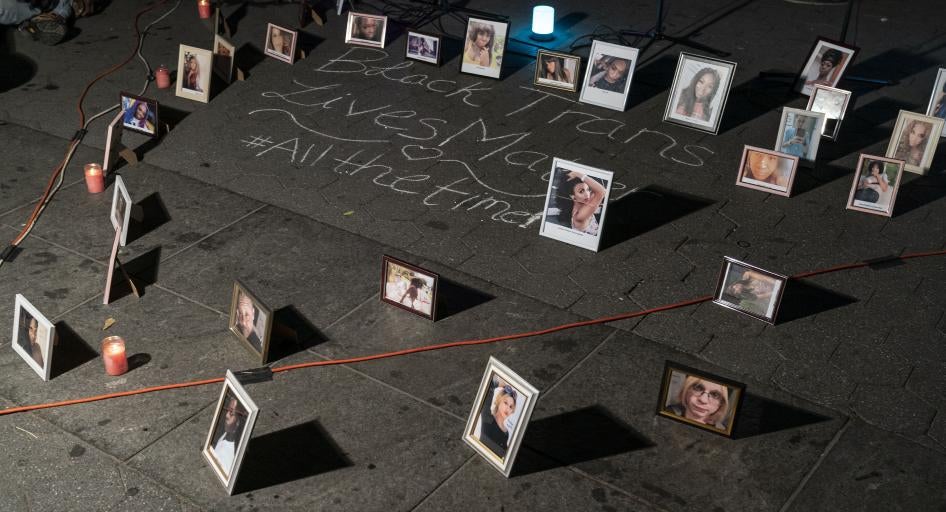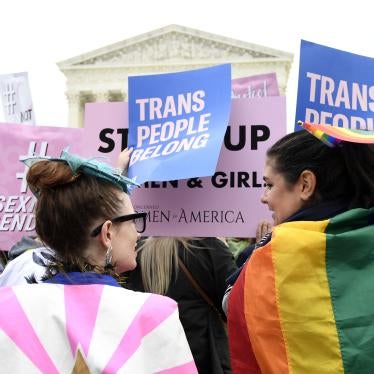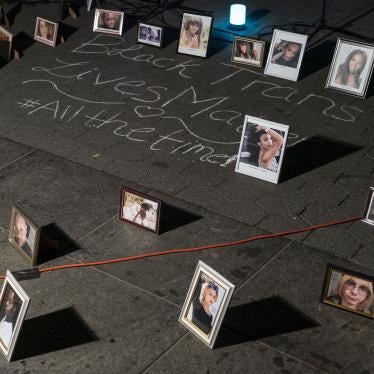(New York) – Transgender people are at significant risk of violence and harassment in the United States, Human Rights Watch said in a report released today.
The 65-page report, “‘I Just Try to Make It Home Safe’: Violence and the Human Rights of Transgender People in the United States,” documents how persistent marginalization puts transgender people, particularly Black transgender women, at heightened risk of violence at the hands of strangers, partners, family members, and law enforcement.
“Every year, advocates document dozens of cases of fatal violence against transgender people,” said Ryan Thoreson, an LGBT rights researcher at Human Rights Watch. “And these killings are symptomatic of a wider pattern of physical and sexual assaults, verbal harassment, and intimidation of transgender people that demands urgent attention.”
Human Rights Watch interviewed more than 60 transgender people, service providers, and advocates, in addition to reviewing available data on anti-transgender discrimination and violence in the United States. Interviews were conducted primarily in Florida, Ohio, and Texas, where dozens of cases of fatal violence against transgender people have been documented in recent years.
A review of cases of fatal violence recorded from 2016 to 2021 illustrates how anti-transgender violence is intersectional, with risk shaped by race, gender, class, and other factors. During this period, at least 88 percent of the transgender people killed in Florida, 91 percent in Ohio, and 90 percent in Texas were people of color. A disproportionate number are Black transgender women, who are particularly affected by fatal violence.
While the administration of President Joe Biden has taken steps to address anti-transgender discrimination, transgender people continue to face widespread hostility in many parts of the United States. In 2021, lawmakers introduced a record number of anti-transgender bills in state legislatures, seeking to restrict transgender people’s access to health care, bathrooms, and sports and recreation. People interviewed said that such actions make them worry even more about their safety in public spaces.
Only 21 states expressly prohibit gender identity discrimination in employment, housing, and public accommodations under state law, leaving transgender people in many parts of the country particularly vulnerable to mistreatment.
Because of family rejection and discrimination in education and employment, many transgender people have limited employment options and work in informal economies like sex work. When this work is criminalized, sex workers are at particular risk of being assaulted or killed by clients and report being reluctant to seek assistance from law enforcement for fear of being harassed or prosecuted.
Data suggests that transgender people face high rates of poverty, and housing insecurity, limiting their ability to leave situations where they are exposed to violence. The barriers that transgender people face in obtaining gender-affirming health care and identification documents can also heighten their risk of violence by increasing the likelihood that others perceive them as transgender and target them for harassment in public spaces, Human Rights Watch found.
While some interviewees described physical and sexual assaults by strangers in public settings, others described violence at the hands of intimate partners, family members, or law enforcement personnel.
When transgender people did experience violence, whether in public or private, many felt they did not have access to services designed to protect people from harm. Discrimination by homeless shelter staff and residents, domestic violence service providers, and law enforcement personnel left some without alternative options or basic resources to keep themselves safe.
Under international human rights law, governments have an obligation to respond to foreseeable threats to life and bodily integrity, and to address patterns of violence targeting marginalized groups. Lawmakers at the federal, state, and local levels should work to address socioeconomic conditions that put transgender people at risk of violence and provide funding and support to ensure that all survivors of violence are able to access the resources they need.
“Simply condemning violence after it happens is too little, too late,” Thoreson said. “If lawmakers are serious about stopping anti-transgender violence, they need to address the poverty and discrimination that put so many transgender people in harm’s way.”








